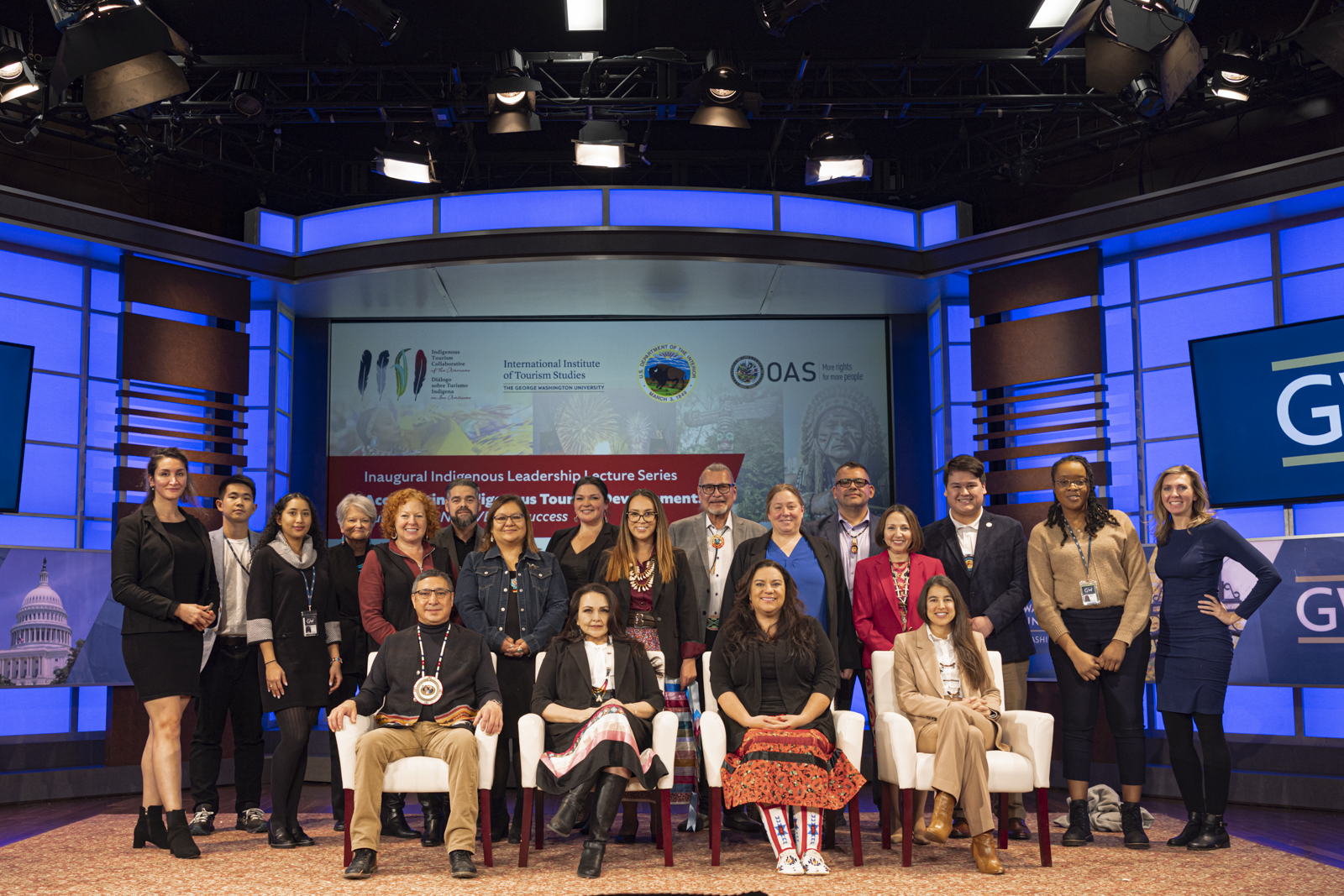Indigenous tourism includes cultural interaction with Native Americans and their natural surroundings, and it is one of the fastest-emerging segments of the travel industry. The International Institute of Tourism Studies (IITS) at the GW School of Business, already at the leading edge of work in native and indigenous economic development, has ramped up its commitment to this travel segment.
The success of the IITS Distinguished Indigenous Leaders Lecture Series, which launched in December 2023, joins the institute’s research and consulting work with tourism initiatives in North and South America. IITS Director Seleni Matus said a new installment of the lecture series is also on the institute’s 2024 agenda, which includes state-level initiatives for tribal tourism in the Great Plains and work with the Indigenous Tourism Collaborative of the Americas (ITCA).
The institute’s work focuses on economic development through indigenous tourism in the United States, Canada, Latin America and the Caribbean.
“When we think of the marginalization of indigenous people in the U.S. and beyond, we do see that there is headway with film and fashion and indigenous leaders stepping into spaces where they haven’t been visible before. There’s definitely more awareness of the 500-plus sovereign nations that exist within the United States,” said Matus, an adjunct professor of tourism. “But there is very impoverished attention given to their needs from an economic development context.”
She said opportunities offered through tourism can have a cascading effect, contributing to investment in education and public services, for example.
“This is an area that is ripe for more support. The story gets very limited attention,” Matus added. “GW is bringing a spotlight to what is happening.”
The inaugural installment of the Distinguished Indigenous Leaders Lecture Series brought together experts to discuss the Native American Tourism & Improving Visitor Experience (NATIVE) Act and its federal funding for Native American tourism, including efforts by Indian tribes, tribal organizations and Native Hawaiian groups.
“We’re in Washington, D.C. … and there is nothing that looks at the progress of this unique piece of legislation. That was a gap,” said Matus. “Given our location, being GW and seeing the work we have done with our federal partners since the NATIVE Act passed a few years ago, it made sense for us to organize this event.
“We created this lecture series to be an annual event focused on economic development and led and guided by indigenous leaders,” she added.
The half-day lecture series leveraged the expertise of Ed Hall III, who joined IITS in late 2022 as its Indigenous Economic Development and Tourism Executive in Residence. The former official with the Bureau of Indian Affairs provided opening remarks at the gathering and moderated a panel featuring K. Denise Litz, chief of the Division of Economic Development at the Office of Indian Economic Development; Toby Bloom, national program manager for the U.S. Forest Service Travel, Tourism and Interpretation unit; and Curt Cottle, senior policy analyst with the International Trade Administration’s National Travel and Tourism Office.
The first portion of the event, co-sponsored by the U.S. Department of the Interior and the U.S. Department of Commerce, looked at federal agencies that fund programming under the NATIVE Act. Wizipan Garriott, the principal deputy assistant secretary for Indian Affairs at the Department of the Interior, joined Shawn Deschene, director of Native American Business Development at the Department of Commerce, and Milo Booth, director of tribal affairs in the Office of the Secretary of Transportation, in speaking to the audience about their agencies’ work.
The second component of the lecture series turned attention to beneficiaries of the federal legislation.
“We looked at three states in particular: South Dakota, North Dakota and Montana—in the Great Plains,” said Matus. “We had indigenous political leaders on that panel and one of the leaders who serves in South Dakota’s legislature.”
The panel included Jamie Azure, the chairman of Turtle Mountain Band of Chippewa Indians in North Dakota; South Dakota State Rep. Tamara St. John, who is a member of the Sisseton Wahpeton Sioux Tribe; and Jennifer Finley of the Confederated Salish and Kootenai Tribes and a member of the Montana Indigenous Tourism Alliance. The panel was moderated by Darian Morsette, president of the North Dakota Native Tourism Alliance and a member of the American Indian Alaska Native Tourism Association board.
“The Future of Indigenous Tourism Collaboration in the Americas” panel discussion addressed links among indigenous tourism operations in and outside the United States. Dawnielle Tehama, executive director of the Willamette Valley Visitors Association in Oregon, served as the panel moderator.
“There are a lot of shared challenges that indigenous people face in developing tourism here in the U.S. and Canada and beyond,” Matus said. “We are trying to maximize the synergies of exchange and interaction.”
Matus noted that the U.S. Agency for International Development (USAID) and the Organization of American States are working to replace the isolation of some native groups with networking that supports tourism, trade exchanges and even archaeological projects. Nikki Enerson, USAID Indigenous Peoples Team lead and development hub deputy director, and Jessa Rae Growing Thunder, indigenous exchange advisor at the Inter-American Foundation, joined Matus in a lively conversation to close out the event.
Largely comprising officials of federal agencies and tribal and community leaders from throughout the Americas, the series brought in more than 150 attendees, with simultaneous translation in Spanish provided throughout the presentations.


